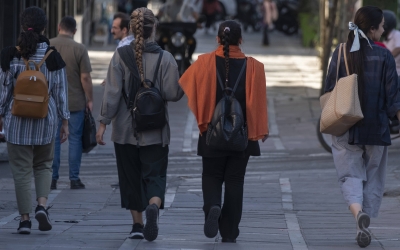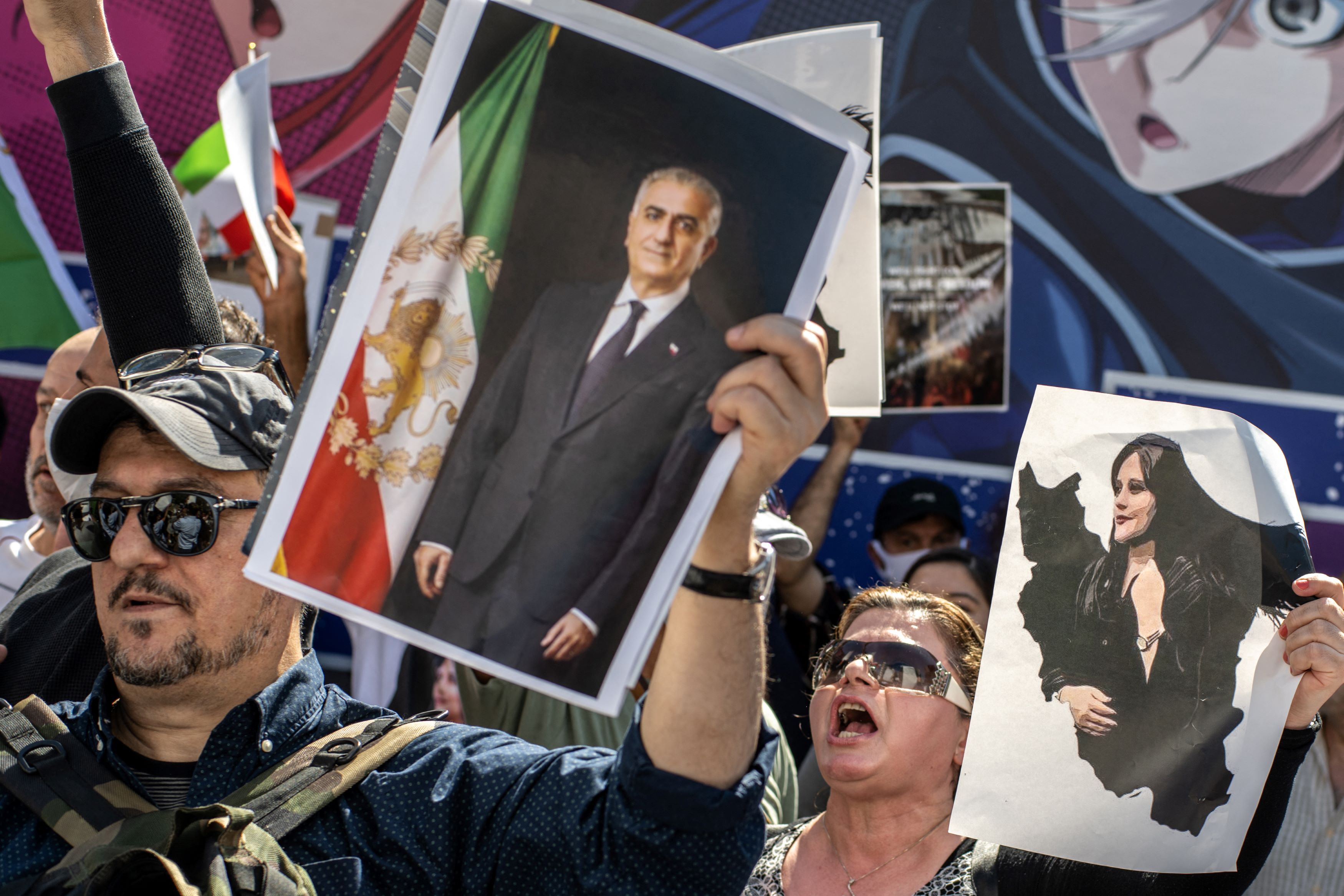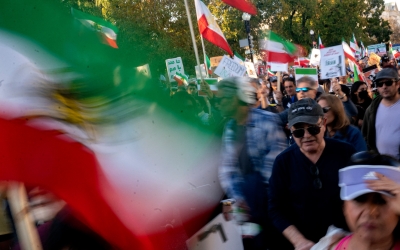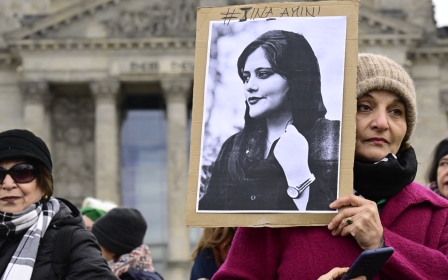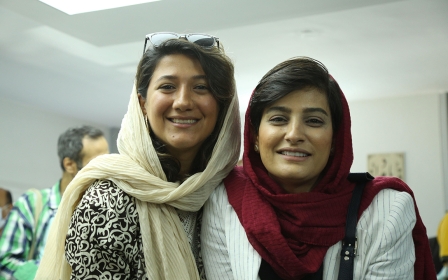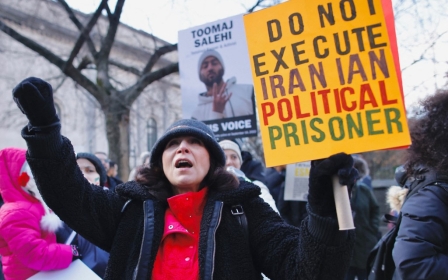Mahsa Amini anniversary: Iran's fractious diaspora prepares for worldwide protests
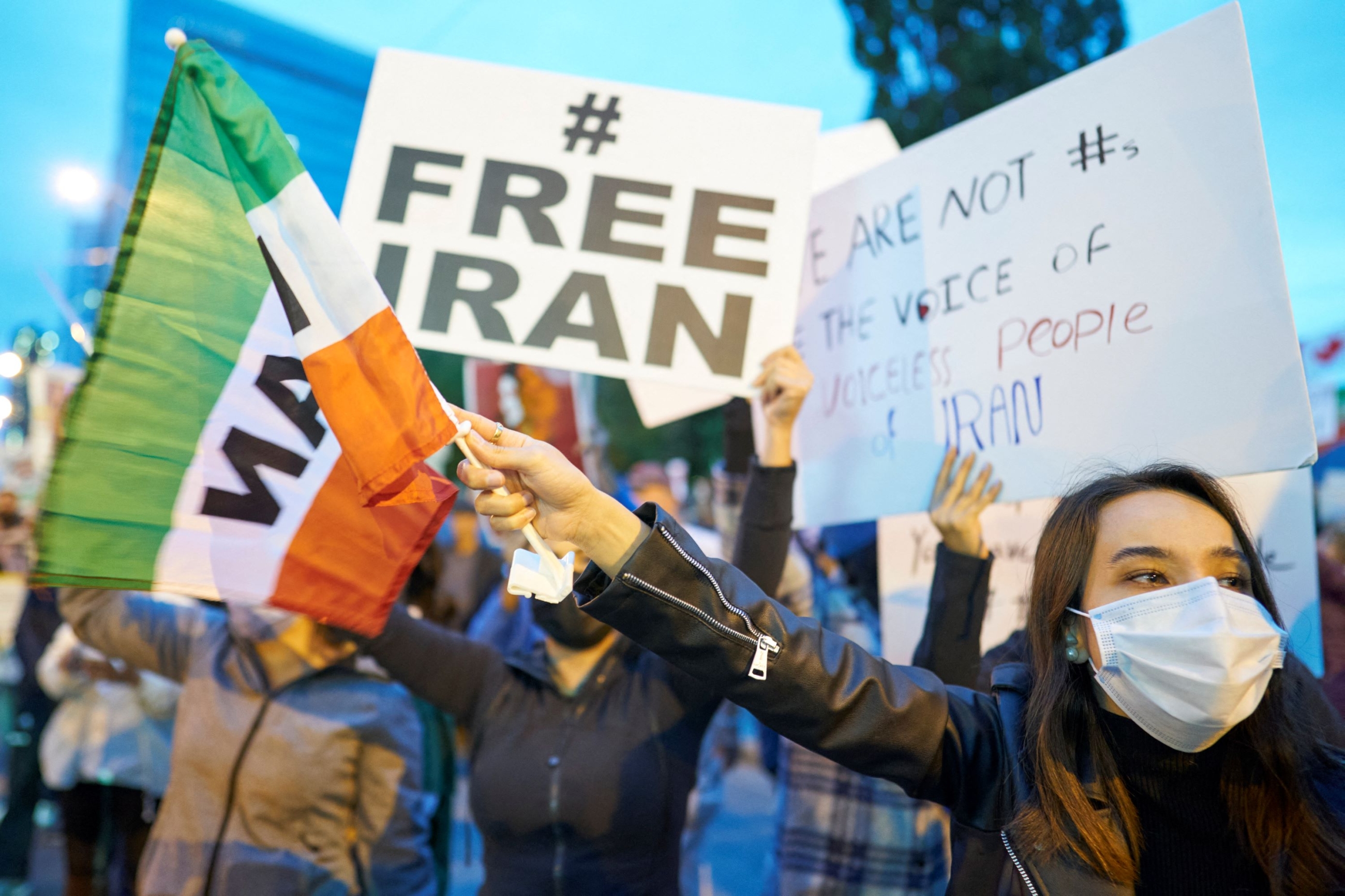
Across the world, Iran’s more than four million-strong diaspora is gearing up once more to show solidarity with their compatriots at home, one year after the death of Mahsa Amini in police custody sparked what is arguably the most consequential anti-government movement in decades.
Iranians living in the US, Europe and the rest of the Middle East have spent the past year watching the uprising against state repression with a mixture of hope and fear, standing on the sidelines as more than 500 protesters were killed by security forces and hundreds more arrested, tortured and executed by the administration.
But despite Iran being rocked by massive protests, over the past year the Iranian opposition outside the country has been gripped by infighting, finger-pointing and an overall failure to build on the momentum in their homeland.
Hamed Esmaeilion has first-hand experience of the difficulties in trying to bring together the different, fractious opponents of the Islamic Republic.
Esmaeilion's wife and daughter were passengers on Ukraine International Airlines Flight 752 that was set to fly from Tehran to Kyiv on 8 January 2020.
New MEE newsletter: Jerusalem Dispatch
Sign up to get the latest insights and analysis on Israel-Palestine, alongside Turkey Unpacked and other MEE newsletters
Shortly after take-off - in what was later described as an accident by Tehran - two surface-to-air missiles belonging to the Iranian Revolutionary Guard Corps (IRGC) struck the plane, bringing it down and killing all 176 passengers on board.
Now based in Toronto, Esmaeilion has spent years campaigning for justice for his family, and when the Woman, Life, Freedom protests erupted following Amini's death, he threw his weight fully behind them.
On 1 October 2022 he helped organise protests in 150 cities across the globe in support of the demonstrators, motivating unprecedented levels of opposition internationally against the Islamic Republic's actions.
This year, on 16 September, he hopes to do the same again, with worldwide demonstrations planned to mark the day Amini, a 22-year-old Kurdish woman, died in the custody of the morality police after being detained for “inappropriate hijab”.
"It starts from New Zealand, different cities in New Zealand, and it ends in Vancouver and San Francisco in one day," he explained.
Esmaeilion said he had been working on plans over the past year, along with The Association of Families of Flight PS752 Victims, that would include a rally in downtown Toronto. The question remained, however, about how events will unfold within Iran itself.
"Unfortunately, it's not predictable if it's going to be a big protest inside Iran or not... the regime is ready for that day. So I don't know where this big fight is going to go, we have to wait and see; that's the only option we have," he said.
"Lots of activists in Iran are under surveillance, they are under pressure, it's very difficult to talk to them - we try, but it's not perfect at all. And the internet is an issue too... my family are in Iran too, my mum and my dad, and I can't speak to them very often because of these issues."
A fractious opposition
The enthusiasm for the protests in Iran, however, has not been enough to paper over widespread ideological and strategic differences within the diaspora.
In February, an attempt was made to unite a range of different opposition forces abroad, bridging long-standing differences between leftists, the right wing, monarchists and ethnic separatists.
Along with Esmaeilion, the newly created Alliance for Democracy and Freedom in Iran included Reza Pahlavi, the son of former Iranian ruler Shah Mohammad Reza Pahlavi, as well as Nobel Peace Prize laureate Shirin Ebadi, campaigner Masih Alinejad and Iranian-Kurdish campaigner Abdullah Mohtadi of the Komala party.
'Everybody was surprised, shocked at the size of this movement inside Iran. I mean, they were not ready'
- Hamed Esmaeilion, campaigner
However, just two months after its formation, the group effectively collapsed after Esmaeilion publicly announced his withdrawal. Ebadi, Alinejad and Mohtadi followed soon after.
Nazanin Boniadi, an actor and founding member of the alliance, would later write that ultimately the "opposition proved to be more fractious than the regime" and warned it would always be a block on any chance of affecting change.
At the time, Esmaeilion attributed his decision to leave to the controlling tendencies of others in the group, primarily Pahlavi.
He told MEE that, in retrospect, they simply hadn't been prepared for what had happened in Iran.
"Everybody was surprised, shocked at the size of this movement inside Iran. I mean, they were not ready," he said.
"It took a long time for everybody to be on the same page. I was not sure if this was the best way to do it, but I decided finally in January to join the group. I joined it in good faith and we worked on a charter and we wanted to do some organisational work."
However, he said he soon realised that there were different understandings of the importance of "organisational work" among the members. Soon afterwards, he decided to leave.
"We have different layers of people out of the country. People who emigrated before the 1979 Islamic Revolution, after that… and there were different waves of people who left the country. Every layer has a different understanding and a different perspective about a future Iran," Esmaeilion said.
"So it's a little difficult - actually, it's impossible to bring everyone together."
'Personal attacks and recriminations'
Over the past 12 months, the infighting among opposition groups became increasingly vitriolic.
Long-simmering grudges between different factions came out into the open - monarchist supporters of Pahlavi engaged in public spats with supporters of the Mujahedin-e Khalq (MEK), despite both being popular among right-wing opponents of the Islamic Republic in Washington.
Others were outraged by the presence of former Shah secret police officials, who in their time engaged in human rights abuses against Kurdish political parties like Komala, at protests adorned with the Kurdish-origin Women, Life, Freedom slogan.
A particular point of contention has been over how foreign governments should respond to the demonstrations and the wider actions of the Iranian establishment.
Organisations and campaigners who have opposed the imposition of sanctions on Iran - arguing that rather than punishing the regime they hurt and demoralise ordinary people - have found themselves subjected to widespread abuse and even death threats.
In November, Iranian commentator Negar Mortazavi told MEE that she feared for her safety after being repeatedly attacked as an apologist for the Islamic Republic over her anti-sanctions stance.
Farnaz Fassihi, a reporter at the New York Times, was also subjected to widespread abuse online by apparent members of the Iranian diaspora over what they claimed was apologism in her reporting.
Mortazavi said much of the anger stemmed from a sense of powerlessness among the diaspora, who were looking for "soft targets" for their anger.
The National Iranian-American Council (NIAC), for which Mortazavi used to work, has been a particular target over its opposition to sanctions and support for the 2015 nuclear deal.
A number of demonstrations in support of the Mahsi Amini protesters have seen placards denouncing NIAC and calling for its closure as an organisation.
Jamal Abdi, NIAC's executive director, said there needed to be scope for discussion on a range of issues in the diaspora, without it descending into "personal attacks and recriminations".
'With Iran’s uprising, rather than broadening the tent or seeking common ground, the diaspora has been sliced and diced and turned against one another'
- Jamal Abdi, NIAC
"Interestingly, several prominent members of the opposition actually supported the Iran nuclear deal in 2015, including Reza Pahlavi who, like us, said sanctions and isolation undermine democratisation," he told MEE.
"But with Iran’s uprising, rather than broadening the tent or seeking common ground, the diaspora has been sliced and diced and turned against one another."
He added, however, that much of the division in the opposition was a clear result of opportunism and misinformation.
"There is strong evidence that these divisions are not an organic phenomenon and that state actors have put their finger on the scales to manipulate the frustrations of Iranians for their own ends," Abdi said.
"There has been widespread platform manipulation on social media to amplify attacks in the diaspora, with Israel, Saudi Arabia, Iran and at one point, under Trump, even the US government getting into the act.
"What these actors all have in common, beyond amplifying divisions in the diaspora, is that their interests are threatened by the prospect of a truly democratic Iran."
'The future is for this generation'
Both the opposition and the government are predicting big things to happen on the anniversary of Amini's death.
Over the past few weeks, the arrest of activists, of family members of imprisoned activists, and even relatives of Amini have already begun in anticipation of unrest.
Demonstrations have already been announced in Amini's town of Saqqez in Kurdistan and many more are expected throughout the country.
As the Iranian diaspora looks on as the events unfold, the debate over what they can do will no doubt continue to rage.
Some will continue to argue that the isolation of Iran has only weakened the resolve of the regime's opponents while allowing senior officials to fill their own coffers as the people starve.
For Esmaeilion, though, the problem is that, if anything, foreign powers have been too willing to accommodate representatives of Tehran. He pointed out that a former Iranian minister had been spotted in Montreal just last month, even if Canada's immigration minister then imposed a temporary travel ban following an outcry.
"My wife and my daughter, they're buried in this country on Richmond Hill," he said.
"And when you see that at the same time, an official of Islamic Republic is in this country and he's running his mouth and he doesn't care about anything - it makes you angry, for sure."
Regardless of the spats within the diaspora, however, he noted that a new generation of Iranians was emerging both abroad and within the country who were building connections in ways that simply had not been available to many older generations.
"The younger generation are coming together, they're forming NGOs and they do advocacy work in their own countries, and they're able now to help Iranians inside the country, medically, financially, and giving legal advice.
"They are very active and they really want this regime to go. It doesn't mean the others don't, but the future is for this generation."
Middle East Eye delivers independent and unrivalled coverage and analysis of the Middle East, North Africa and beyond. To learn more about republishing this content and the associated fees, please fill out this form. More about MEE can be found here.


